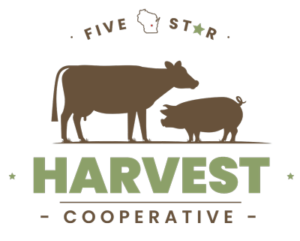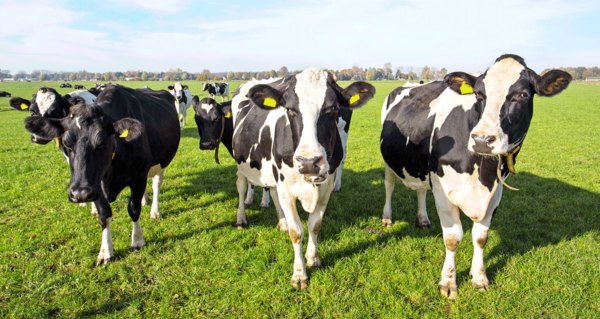success story
A co-op aimed at family farmers
Five Star Harvest Cooperative will process meat for small farms
A new option is in the works that would make it easier for family farmers in south central Wisconsin to bring their animals to market.
Five Star Harvest Cooperative, a farmer-owned co-op, has been created with the goal of providing slaughtering and processing services for small farms more quickly and efficiently than traditional providers.
 Bender Family Farms, in Green Lake County, is one of the farms involved in the project. Co-owner Becky Bender says landing an appointment with a major processor to bring animals for slaughter has always been challenging for small farms, as they have to compete with big cattle operators. But during the height of the pandemic, the problem worsened significantly.
Bender Family Farms, in Green Lake County, is one of the farms involved in the project. Co-owner Becky Bender says landing an appointment with a major processor to bring animals for slaughter has always been challenging for small farms, as they have to compete with big cattle operators. But during the height of the pandemic, the problem worsened significantly.
“It was difficult to get spots to harvest animals. In 2020, we were on wait lists for 18 months to two years,” Bender says. That could mean higher feed costs, overcrowding, and no homegrown meat for farm families.
Farmers in her area floated the idea of forming a processing cooperative. But first, they would have to find out what it would take to succeed.
WEDC-funded study
Becky and her husband, Melvin, live on the farm where Melvin grew up, in the township of Kingston. In 2016, they incorporated Bender Family Farms, where they milk 120 cows and raise another 150 to 200 steers. But running a processing business would be a lot more complicated.
The prospective co-op group applied for a $14,5000 WEDC Cooperative Development Grant in 2022 to obtain a feasibility study. “To start any kind of business, you have to have capital. And to get capital, you need a plan. The feasibility study would help give us direction as a cooperative and would help us talk to lenders,” Bender says.
Meanwhile, the farmers began working on policy issues and gauging local interest. A steering group held meetings every other week, consulting with the University of Wisconsin-Madison Center for Cooperatives. They drew up articles of incorporation and bylaws with the help of a UW-Madison law student; they formed a board of directors. UW- Extension conducted a survey of farmers in more than half a dozen counties in the region, including Green Lake, Columbia, Waushara, Marquette, Dodge, and Fond du Lac.
Even before the year-long feasibility study was ready, the farmers were so encouraged by the initial results that they created the Five Star Harvest Cooperative in October 2022.
 When the study was completed in May 2023, it showed that a meat processing co-op could become profitable if 30 to 35 animals are processed each week, 50 weeks a year. The operation would require a building with space for freezers and coolers, where the meat could hang for up to 10 days to tenderize. The study gave an estimate of the dimensions for a prospective building, how many employees would be needed, and how much they should be paid.
When the study was completed in May 2023, it showed that a meat processing co-op could become profitable if 30 to 35 animals are processed each week, 50 weeks a year. The operation would require a building with space for freezers and coolers, where the meat could hang for up to 10 days to tenderize. The study gave an estimate of the dimensions for a prospective building, how many employees would be needed, and how much they should be paid.
Bender, who is secretary of the co-op, says she is confident that the co-op could generate enough animals for processing. “We anticipate our capacity will be 30 cattle and 10 hogs per week, or about 1,500 cattle and 500 hogs per year,” she says. “Results of the survey showed us that there would be plenty of people interested in looking for spots.”
The cooperative model is “good for the community,” Bender says, because it helps farmers work together and share the costs. “One person can’t see all the angles, she says “but multiple viewpoints help as we try to solve problems.”
Finding a home
Eight farms in Green Lake and Columbia counties are the initial members of Five Star Harvest Cooperative. Some plan to use the processed meat to sell at farmers markets, one owns a retail store, and one simply wants to feed his family.
A membership drive is planned in the future, and Bender says she hopes at least 150 will join. Even though the wait for a processing date is shorter now, Bender thinks farmers are still interested in the cooperative idea.
But first, the co-op needs a home, and that’s been the biggest challenge so far. The board has looked at existing buildings, but would prefer to construct its own processing plant (on at least four acres) to fit its needs. The estimated cost: $500,000 to $750,000. Selling shares in the co-op will raise some of the money, and Bender says the board will seek loans and grants as well.
More than one land deal has already fallen through. Another site is awaiting approval from local authorities. If approved, the co-op hopes to break ground next spring and have a plant ready to operate by the end of 2025. The co-op would start with slaughtering and processing, and could eventually offer a retail sales counter. Plans call for employing up to 12 people.
Bender says making a meat processing plant available to small family farmers in the region will benefit both farmers and consumers and will “be a strong link in the security of the local food system.
“Knowing your farmer and knowing where your meat is coming from is important. This will give farmers more marketability and will let them work more closely with their customers,” she says. “I think this will help keep family farms alive.”
“I think this will help keep family farms alive.”
